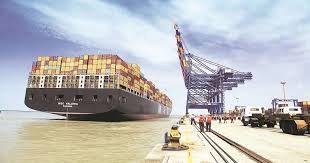Salient features of the Project
Strategic Location – Located on the International Trade Route, with existing transhipment terminals like Singapore, Klang and Colombo in proximity.
Draft – Natural depth of 20m
Catchment – Potential to capture transhipment cargo from the similar international facilities in the sub-continent and Ports in the proximity including Indian Ports.
Project features for Phase 1 – Two breakwaters, 400m wide navigational channel, 800m dia turning circle, total berth length of about 2.3km translating to 7 berths, 125 Ha for container yard, container handling equipment including RMQCs and RTGs, provision to develop 2 liquid cargo berths
Working towards the Island Development program announced by the Government, the Ministry of Ports, Shipping and Waterways, as part of the Holistic Development of Great Nicobar Island, is working towards development of Mega International Container Transhipment Port (ICTP) at Galathea Bay of Great Nicobar Island of Andaman and Nicobar Islands in Bay of Bengal. Other projects include, Airport, Township & Power plant. Holistic Development of Islands aims to bridge the gaps in infrastructure and improve economic opportunity for rapid increase in size for all types of vessels, from feeders to the large inter-continental carriers. Further, the proposed infrastructures facilities shall be such that the service levels and facilities match with that of the global top container transhipment terminals and neighbouring ports.
The project focuses on three key drivers which can result in making it a leading container transhipment port, i.e. strategic location in terms of proximity (40 nautical miles) with the International shipping trade route, availability of natural water depth of over 20m and carrying capacity of transhipment cargo from all the Ports in the proximity including Indian Ports.
Experts have long maintained that a strong economic case exists for enabling a transhipment hub in India that can attract Indian and regional transhipment traffic from the current hubs, save significant revenue loss, reduce logistics inefficiencies for Indian trade, reduce risks to the country’s export competitiveness and create an opportunity for India to become a large hub for Asia-Africa, Asia-US/Europe container traffic trade. Currently, nearly 75% of India’s transhipped cargo is handled at ports outside India. Colombo, Singapore and Klang handle more than 85% of this cargo with 45% of this cargo handled at Colombo Port. Indian ports can save $200-220 Million each year on transhipment cargo. Also, developing Galathea Bay Transhipment Port will accrue significant benefits such as forex savings, foreign direct investment, increased economic activity at other Indian Ports, enhanced logistics infrastructure and thus, efficiencies, employment generation, and increased revenue share. Several other allied businesses viz. ship chandlery-ship supplies, ship repair, crew change facility, logistics value added services, warehousing and bunkering also planned at this Transhipment Port. Additionally, there is a potential of creation of around 1700-4000 incremental direct jobs by end of this project.
The proposed facility is envisaged to be developed in four phases with the total estimated cost of ~INR 41,000 crore. Phase 1 proposed to be commissioned in the year 2028 with handling capacity of ~ 4 Million TEUs, increasing to 16 Million TEUs in the ultimate stage of development. The estimated cost for Phase 1 of the proposed transhipment port is around INR 18,000 crore which includes the construction of breakwaters, dredging, reclamation, berths, storage areas, building and utilities, procurement and installation of equipment and development of port colony with core infrastructure is going to be developed with the government support.
Public Private Partnership (PPP) will be encouraged for this project via Landlord mode. The PPP Concessionaire shall have the flexibility to develop storage area, container handling equipment and other infrastructure based on concessionaire’s own market and business assessment subject to the Minimum Guaranteed Traffic. The Concessionaire would be awarded a long-term PPP concession of 30 to 50 years (based on requirement), shall be responsible for the provision(s) of port services and shall have the rights to levy, collect and retain charges from port users.
Expressing his happiness on this milestone of MoPSW, the Union Minister of Ports, Shipping and Waterways and AYUSH.





















